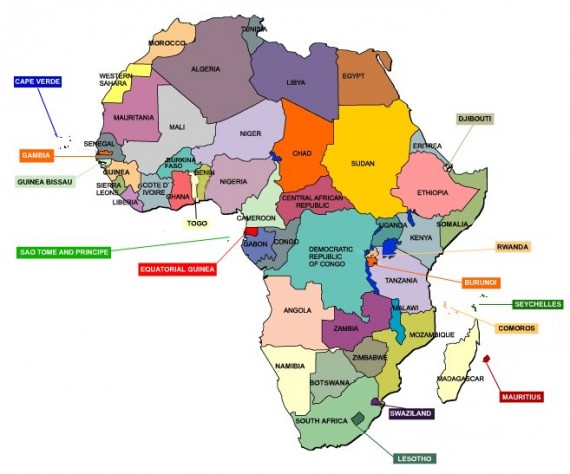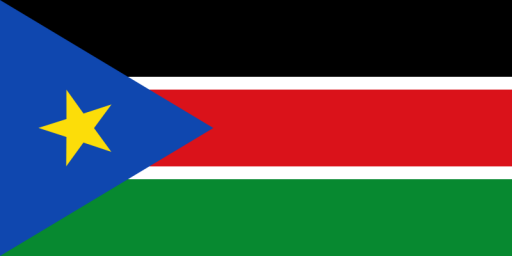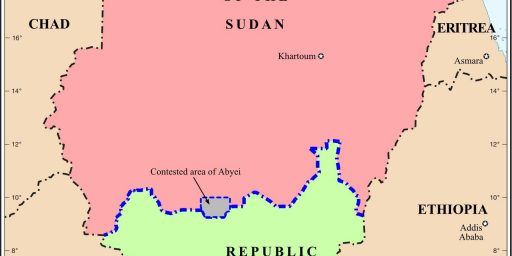Because Africa Just Doesn’t Have Enough Landlocked Countries
What happens if Southern Sudan's independence referendum succeeds?
The referendum in Southern Sudan to determine whether the region will secede from the north to form an independent country has reached the necessary 60% mark:
Southern Sudanese officials say they have received the 60 percent voter turnout needed to validate the region’s landmark independence referendum.
Anne Itto, a senior official for the Sudanese Peoples Liberation Movement, made the announcement Wednesday as the fourth day of voting got underway.
Official turnout figures are the responsibility of the South Sudan Referendum Commission, which has not confirmed that the threshold has been reached.
Nearly 4 million people are registered to vote in the referendum which is widely expected to lead to southern Sudan seceding from the rest of the country. Preliminary results are expected next week.
If, as most expect, the referendum succeeds, I have little doubt that Southern Sudan will declare its independence but then what? As this post at Coming Anarchy explains, dividing this baby is far from trivial. Add to that that most of the oil is in Southern Sudan (Sudan is currently Africa’s third largest oil producer) while access to the sea is in the north and I think it’s apparent that while secession would solve some problems it will create many others.
Here’s a partial list of landlocked countries in Africa:
- Mali
- Niger
- Burkina Faso
- Central African Republic
- Ethiopia
- Uganda
- Rwanda
- Burundi
- Zambia
- Zimbabwe
- Malawi
- Botswana
Many of the countries on the list have experienced famine, civil upset, and massacres. I can’t honestly say what role their being landlocked has played in those. It might be that the conditions that caused the boundaries to be drawn in that way also set the stage for later problems.






Ethiopia, known for famine when I was growing up, is land locked yet exports most of it’s white pea beans through Djibouti. Citizens starve while food is exported for profit.
What then? Then, the people in the predominantly Christian and animist south don’t have to worry about being literally put to death by the hard-core, Sharia-implementing head of the majority-Muslim north. The two parts of the country used to get along (mostly), but the President there has recently started making noises about making it the true Law of the Land, and frankly, scared the crap out of every non-Muslim in the vicinity; so much so that they made a whole new country to get away from him.
Many (not all, but many) of the problems in Africa are a result of the history of colonialism and all the consequences arising from it and the decolonialism of the continent.
Things are so complex there that it is impossible to assign single, dual, or even triple causes to most of the disasters.
Sadly, there is also no clear path to make things better.
And, of course, those in the north will unfailingly accept the division and the border.
Congo is quasi-landlocked even though it has a small Atlantic coastline. Its seaport of Matadi cannot accommodate large ships due to insufficient depth and in any event is notoriously corrupt and inefficient. As a result, much of Congo’s foreign trade comes through the modern seaport of Pointe-Noire in neighboring Congo-Brazzaville and is shipped overland to Kinshasha.
The current national government has already accepted the possibility of division without being over-thrown by a mob, so there’s a better than average chance of that being okay. The border issues is, IIRC, supposed to be negotiated after the vote for secession. I gather that there is a fairly well accepted border, but the devil is in the details as they say. As you mentioned, the oil will still have to go through the North, so likely the ultimate deal will involve the sharing of revenue derived from the sale of oil.
I’m not going to claim expertise (although I have seen Khartoum from my airplane window, so maybe I can have a Discovery Channel show), but I really don’t think landlocked is one of the more important determining factors. Switzerland is landlocked. Haiti is surrounded by water. Even looking at your list, Botswana is one of the more functional and prosperous countries in sub-Saharan Africa. Zimbabwe was and would still be if they had had an ocean to throw Mugabe into before he went off the deep end. South Sudan’s oil today does flow north but there has been talk China would build a pipeline from Juba out to Kenya. I don’t know much about South Sudan but if I lived there I’m quite sure I wouldn’t like being ruled by the scary people who run the north. I can’t think of many more obvious candidates for a secession.
One of the biggest problems of the colonialist era was how they drew maps and territories. Tribes that had hated each other for eons were thrown together by the colonizing country which then enforced the law and kept the old fires from flaring out of control (for the most part). When the colonizing countries were thrown out or left, the power vacuum let the old smoldering hates re-ignite and the internal battles seem to end up destroying the nations from within regardless of resources or coastal proximity. Maybe, and I hope it does, the separation will allow the moslems to go their way and the peoples of the south to go their way. mpw